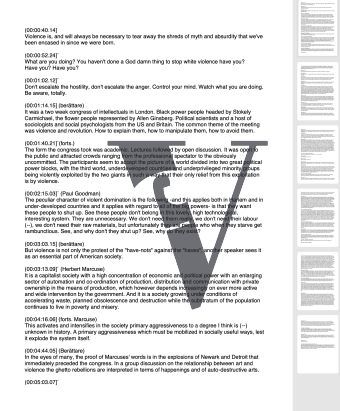Dialectics of Liberation - Introduction (1967)
The Congress on the Dialectics of Liberation (for the Demystification of Violence) took place in London’s Roundhouse between the 15th and 30th July 1967. Organised by the American radical educationalist and anti-psychiatrist Joe Berke and his colleagues in the Institute of Phenomenological Studies, it was a bold attempt to ‘demystify human violence in all its forms, and the social systems from which it emanates, and to explore new forms of action.’
The congress emerged out of Joe Berke’s involvement with the free universities movement in the United States and out of Alexander Trocchi’s idea for a ‘spontaneous university’ as a ‘detonator’ for revolutionising contemporary existence.
The event drew together the bohemian culture of New York’s Lower East Side with Europe’s own rebel groups in art, literature, politics and psychiatry, producing what has been justly described as the ‘numero uno seminal event of [London] 67’, a sometimes joyous but often angry anti-coalition of ‘politicos’ and ‘culture wizards.’
‘All men are in chains’, runs a flyer for the congress. ‘There is the bondage of poverty and starvation: the bondage of lust for power, status, possessions. A reign of terror is now perpetrated and perpetuated on a global scale. In the affluent societies, it is masked. There, children are conditioned by violence called love to assume their position as the would-be inheritors of the fruits of the earth. But, in the process, they are reduced to little more than hypothetical points on a dehumanized co-ordinate system. …We shall meet in London on the basis of a wide range of expert knowledge. The dialectics of liberation begin with the clarification of our present condition.’
The congress opened on the morning of the 15th with a lecture by the anti-psychiatrist R.D. Laing and closed on the 30th with a lecture by the digger Emmett Grogan, following an happening by Carolee Schneemann and a performance by the British pop group The Social Deviants the previous evening.
Gregory Bateson, Stokely Carmichael, Paul Goodman and the German philosopher, Herbert Marcuse were amongst other public figures who spoke. There were seminars in the afternoons and films and poetry readings in the evenings. ‘The Provos were there from Amsterdam. There were students from West Berlin, political activists from Norway and Sweden as well as a large contingent from the New Experimental College, Thy, Denmark. There were representatives from the West Indies, Africa, France, Canada, America, Holland, India, Nigeria and Cuba,’ remarks the poet Susan Sherman, one of Berke’s friends, who covered the congress for Ikon magazine.
The congress radicalised many black (and white) people in the audience and acted as an (ironic) influence on the Women’s Liberation movement. It also led to the foundation of the anti-university of London in Shoreditch in 1968, a further important experiment in radical education.



